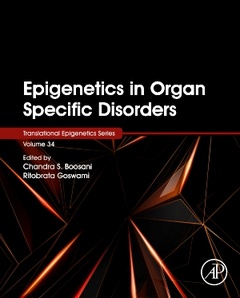Epigenetics in Organ Specific Disorders Translational Epigenetics Series

Organ specific epigenetic mechanisms and biomarkers of early use in developing drugs, which can selectively target the organ of interest, are also explored to enable new precision therapies.
2. Epigenetic signatures that maintain stemness in pluripotent and mesenchymal stem cells
3. Cell-cell and Cell-matrix interactions mediated by histone deacetylases
4. Enhanced cell proliferation and altered gene expression due to actions of DNA methyltransferases
5. Histone deacetylases and regulation of gene expression during cell proliferation
6. Epigenetic mediators that promote cytoskeletal reorganization and cell migration
7. Inhibition of cellular apoptosis and senescence by unique epigenetic proteins
8. Epigenetic mechanisms involved in the regulation of necrosis and pyknosis
9. Epigenetic control over cell division in pathological conditions
10. Regulated expression of tumor suppressor proteins by DNA methyltransferases during cell cycle progression
11. Role of histone deacetylases in regulating cell cycle progression
12. Phenotype switch and cell differentiation in immune and non-immune cells regulated by different epigenetic mediators
13. Epigenetic pathways that promote cellular autophagy
14. Epigenetic inducers of Cell growth and survival
15. Microbial compounds as potential inducers of epigenetic mechanisms during infections
16. Current epigenetic drugs and their target proteins with potential use in disease treatment
17. Prospects of epigenetic drugs in combination therapy
- Identifies unique epigenetic mechanisms that occur in normal and disease conditions in each organ, examining differences and similarities
- Explores organ specific epigenetic mechanisms to enable drug discovery and development
- Features chapter contributions from leading researchers in the field
Date de parution : 12-2022
Ouvrage de 666 p.
19x23.4 cm
Mots-clés :
Epigenetics; human epigenetics; translational epigenetics; epigenetic mechanisms; Epigenetic signature; mesenchymal stem cells; Cell-matrix interactions; histone deacetylases; cell proliferation; gene expression; DNA methyltransferases; Epigenetic mediators; cell migration; cellular apoptosis; epigenetic proteins; necrosis; pyknosis; tumor suppressor proteins; immune cells; non-immune cells; epigenetic drugs; pharmacoepigenetics



